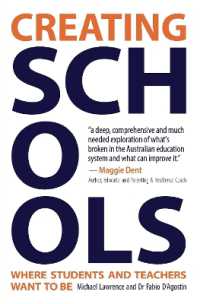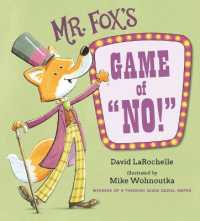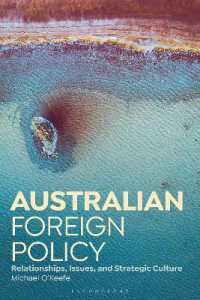- ホーム
- > 洋書
- > 英文書
- > Literature / Classics
Full Description
Phoenissae is probably Seneca's final play, left unfinished at the time of his death in 65 CE from a suicide ordered by the emperor Nero. It is a work of great dramatic, poetic, and intellectual force, a paradigm of Rome's literature of civil war, packed with the latter's vocabulary and imagery and permeated by issues central to Senecan thinking and tragic practice. Prominent themes include: the imperatives of family and self, of identity and place; violence and cost (psychological, familial, social); anger, self-loathing, suicide, and moral action; fate, guilt, horror; the cyclicity and triumph of evil; the allure of power; the violation of nature; the failure of pietas. Also meriting notice are more formal issues of theatricality, literary self-consciousness, and belatedness. Especially important is the theme of incest, its dissolution of political, moral, social, and natural order, its collapse of individual identity, its function as metaphor for the evil of civil war. Like the unfinished epic of Seneca's nephew Lucan, Phoenissae is immediate precursor to the bloody internecine warfare of 68-69 CE and a prophetic mirror of Rome.
This is A. J. Boyle's seventh full-scale edition for OUP of a play by or attributed to Seneca. It offers a comprehensive introduction, newly edited Latin text, English verse translation designed for both performance and academic study, and a detailed exegetic, analytic, and interpretative commentary. The aim has been to elucidate the text dramatically as well as philologically, and to locate the play firmly in its contemporary historical and theatrical context and the ensuing literary and dramatic tradition. As such, its substantial influence on European drama from the sixteenth to the twenty-first centuries is given emphasis throughout; this and the accessibility of the commentary to Latinless readers make the edition particularly useful to scholars and students not only of classics, but also of comparative literature and of drama, and to anyone interested in the cultural dynamics of literary reception and the interplay between theatre and history.
Contents
Preface
INTRODUCTION
I Seneca and Rome
II Roman Theatre
III The Declamatory Style
IV Seneca's Theatre of Violence
V Seneca and Suicide
VI The Myth Before Seneca
VII The Play
VIII Reception of Seneca's Phoenissae
IX Metre
X The Translation
TEXT AND TRANSLATION
Selective Critical Apparatus
Differences from the 1986 Oxford Classical Text and the 2002 Loeb Classical Library Edition
COMMENTARY
Select Bibliography
Indexes
I Latin Words
II Passages of Other Plays of the Senecan Tragic Corpus
III General Index








